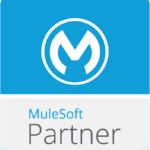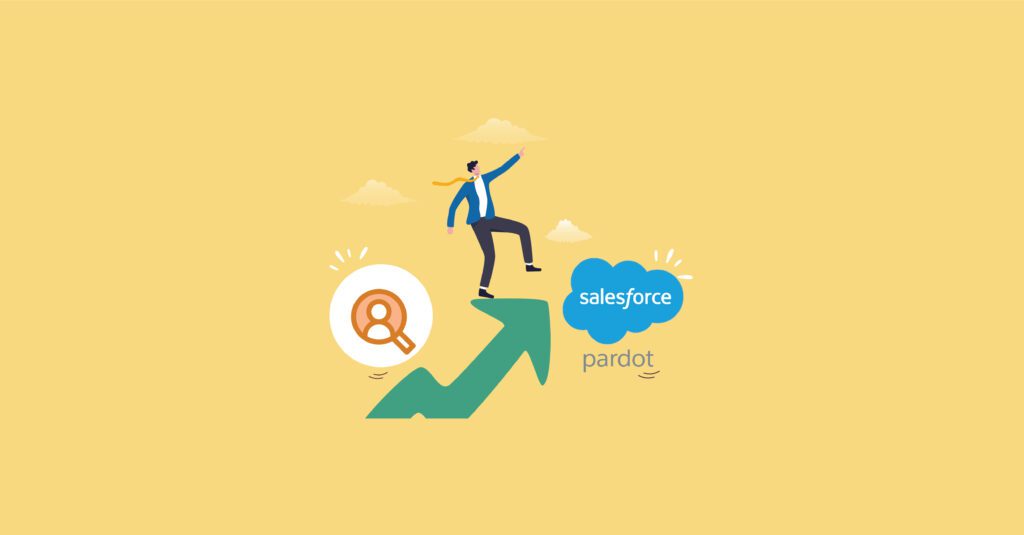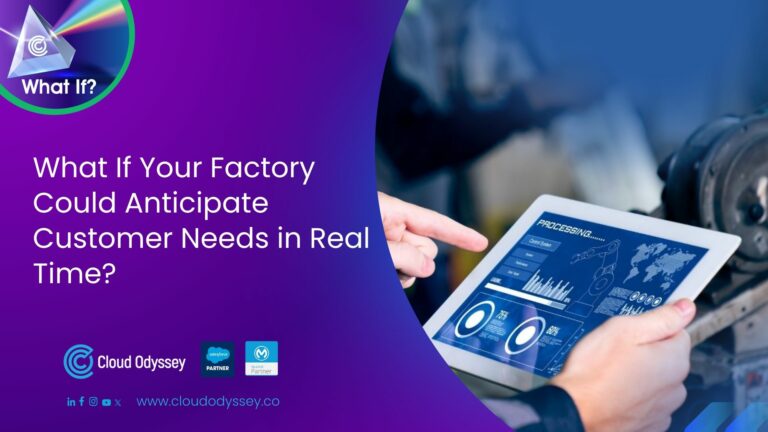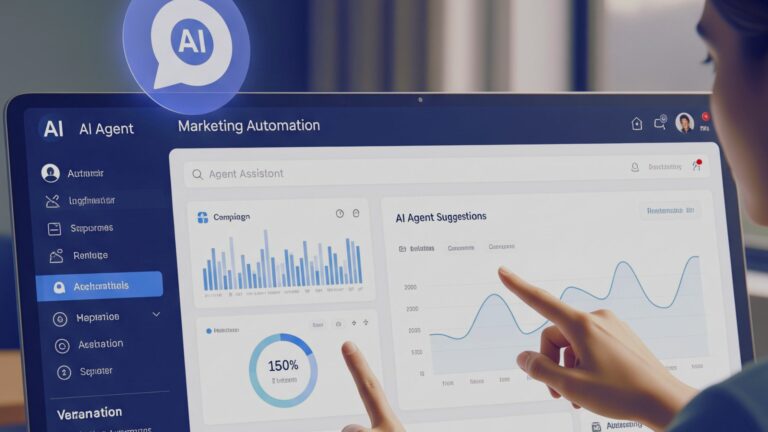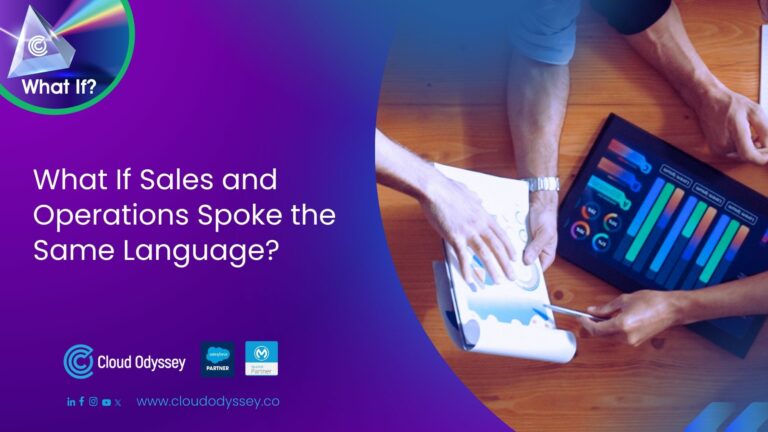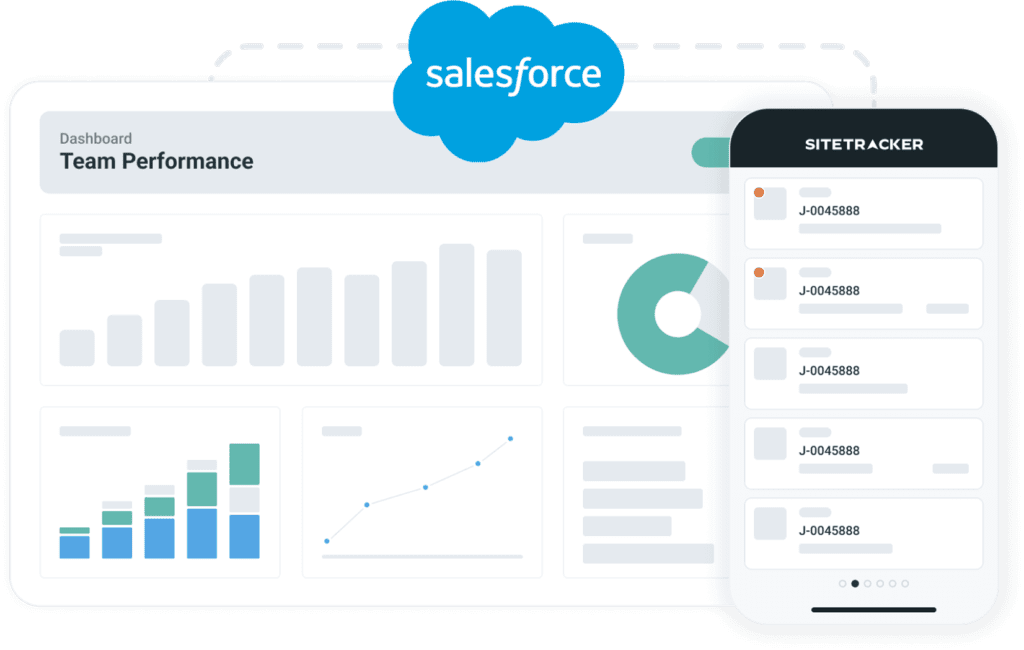Pardot pricing guide, plans, features, and cost comparison
In this article, we’re going to talk about all the different pricing and plans for Marketing Cloud Account Engagement (MCAE). We’ll compare the features and prices so you can find the best plan for your business, no matter if you’re a small business just getting started or a big company with more complex needs. We’ll also cover any extra costs you might have, like add-ons or customization options. By the end, you’ll know everything you need to know about the cost of MCAE and how to pick the right plan for your business. Sounds good?
Salesforce Marketing Cloud Account Engagement pricing (Pardot pricing)
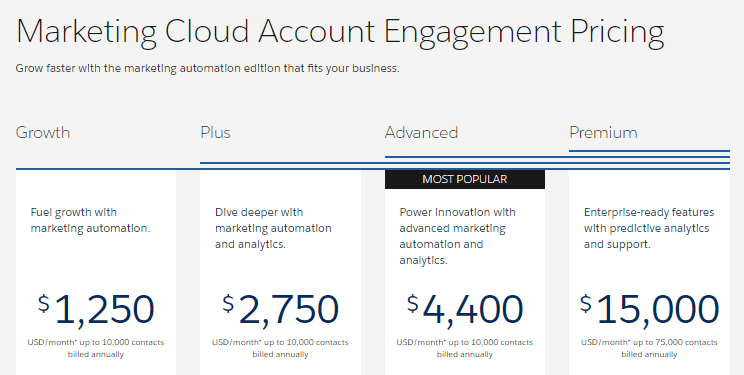
A quick look at the Marketing Cloud Account Engagement editions (Salesforce Pardot editions)
Offers different editions to meet the needs of different businesses.
The available editions are:
1) Standard → (Pardot) Growth: $1,250 per month
This version is suitable for businesses that want to start using marketing automation. It has features like email marketing, lead generation, lead nurturing, and lead scoring. (Best suited for small-business solutions)
2) Pro → (Pardot) Plus: $2,750 per month
This version is made for businesses that want to do more with marketing automation. It has extra features like advanced email marketing, lead generation, and lead nurturing.
3) Ultimate →(Pardot) Advanced: $4,400 per month (MOST POPULAR)
This edition is for businesses that want to take their marketing automation to the next level. It has features like automation rules, dynamic content, and integration with Salesforce Einstein.
4) (Pardot) Premium: $15,000 per month
This edition is the most comprehensive option, and it has all of the features of the other editions, plus advanced analytics, predictive lead scoring, and integrations with other Salesforce products.
Note: The above is just general information. For more specific information, feel free to contact our Cloud Odyssey Sales Team at info@cloudodyssey.co or visit the official Salesforce website.
Each edition has a different price, and the features and capabilities that come with it depend on which version you choose. You can look at the different editions and choose the one that fits your business needs.
Extend Account Engagement
1) B2B Marketing Analytics Plus $3,000/user/month* (billed annually)
AI-driven insights for dashboards and reports that provide a holistic view of marketing performance Advanced segmentation and targeting capabilities help companies better understand their target audience.
2) Sales emails and alerts (Salesforce Engage) $50/user/month* (billed annually)
allows sales teams to track and communicate with leads directly within the platform. This helps sales teams stay organised and keep in touch with clients through alerts and trend reports, which makes it easier for them to move leads through the sales funnel.
3) Additional contacts contacts/month*
Also, once the maximum number of contacts that come with each subscription plan has been reached, you can buy additional contacts for $100 per 10,000 contacts per month.
4) Engagement history dashboards cost $300/year/user.
Each package comes with a certain number of free dashboards.
- Pardot Growth – 5
- Pardot Plus – 10
- Pardot Advanced – 20
- Pardot Premium – 20.
An engagement history dashboard is a feature of MCAE that lets users see and analyse the engagement history of their prospects. This can include things like emails that were opened, website visits, form submissions, and more.
Click here to learn: Salesforce Add-on
5) Sales emails and alerts $50/user/month*
Empower sales to connect early, often, and effectively using sales emails and alerts with MCAE.
Key Take-Away Points: Depending on your plan, some features may cost extra. You’ll need to contact the Salesforce team or the Cloud Odyssey sales team directly to find out more. All four plans come with a user forum, weekly live training, training videos you can watch whenever you want, and a team of success specialists.
Differences between Marketing Cloud Account Engagement editions (Pardot Edition Comparison)
| Plan | Pardot Growth | Pardot Plus | Pardot Advanced | Pardot Premium |
| Price | $1,250/month | $2,750/month | $4,400/month | $15,000/month |
| Users | Unlimited | Unlimited | Unlimited | Unlimited |
| Storage | 100 MB | 500 MB | 10 GB | 10 GB |
| Contact limit | 10,000 | 10,000 | 10,000 | 75,000 |
| Daily API Call Limit | 25,000 | 50,000 | 100,000 | 100,000 |
| Content Marketing | ✅ | ✅ | ✅ | ✅ |
| Paid marketing | ✅ | ✅ | ✅ | ✅ |
| Omnichannel features | ✅ | ✅ | ✅ | ✅ |
| Lead Generation, Qualification, and Management | ✅ | ✅ | ✅ | ✅ |
| Email Marketing and Personalisation | ✅ | ✅ | ✅ | ✅ |
| Advanced Automation, Personalisation, and Qualification | ❌ | ✅ | ✅ | ✅ |
| Advanced Analytics and Reporting | ❌ | ❌ | ✅ | ✅ |
| Business Units and Developer Sandboxes | ❌ | ❌ | ✅ | ✅ |
| Artificial Intelligence for Marketing and Sales | ❌ | ❌ | ✅ | ✅ |
| Predictive Analytics and Personalised Product Support | ❌ | ❌ | ❌ | ✅ |
Top features of Marketing Cloud Account Engagement (Pardot features) 2023
1) Getting leads, making sure they are good, and managing them
Lead generation is the process of finding and attracting people who might be interested in buying from a business. Such as forms and landing pages that website visitors can fill out, email campaigns that target specific groups, and integrations with social media platforms to reach a wider audience.
Lead qualification is about figuring out which leads are the most valuable and how ready they are to buy. It involves scoring and grading leads based on how well they fit your ideal customer profile.
Lead management is the process of taking care of leads all the way through the sales process, from the first contact to the final sale. Businesses can manage leads more efficiently and make sure they get the right follow-up at the right time with the help of automation.
2) Email marketing and personalisation
Businesses can create and send email campaigns to specific contact lists that appear professional. The platform makes it easy to design and customise emails by giving you templates and a drag-and-drop editor. It also has advanced features for email marketing, such as A/B testing and automation, to help businesses improve their campaigns and get better results.
Businesses can use personalisation tools to make email campaigns that are relevant and speak to the interests and needs of each subscriber. Companies can create personalised email content and subject lines by using data from marketing automation platforms and other sources, like CRM systems.
3) Automation, personalisation, and qualifications that are more advanced
Advanced Automation is a feature that lets users make automated marketing campaigns and workflows based on how prospects act, as well as personalised marketing campaigns based on how prospects act and what they are like. It helps businesses find qualified leads and keep track of them based on how engaged their prospects are.
4) Analytics and reporting on a higher level
With advanced analytics, businesses can track key metrics in real-time, like how many people visit their website, open and click on their emails, and fill out their forms. The platform also works with Google Analytics to give even more detailed information about how a website is doing.
Reporting tools let businesses make custom reports that track how well their marketing campaigns are doing or how well their marketing efforts are working as a whole. You can make your own reports using the drag-and-drop interface that comes with the platform.
5) Business units and “Sandboxes” for developers
Businesses with multiple departments or subsidiaries can manage their marketing and sales efforts on their own with the help of business units. In marketing cloud account engagement, each business unit has its own account with its own set of users, assets, and campaigns. This can help businesses with different brands or product lines that need to be managed separately or with different teams working on different marketing projects.
Developer sandboxes are separate environments where developers can test and try out new code and customizations without affecting the production environment. This can be helpful for businesses that want to make changes to their accounts without affecting their current campaigns or assets.
5) Using AI to help with marketing and sales
Predictive analytics is one of the most important parts of AI. It uses machine learning algorithms to look at data from the platform and predict what will happen in the future. Businesses can use predictive analytics to figure out, for example, how likely it is that a lead will become a customer or when the best time is to send an email to a certain lead.
Includes suggestions for marketing campaigns and sales outreach that are based on AI. Based on a lead’s interests and actions, the platform can suggest the best emails or content to send to that lead or suggest the best follow-up actions for sales reps.
6) Predictive analytics and individualised customer service for products
Machine learning algorithms are used in predictive analytics to look at platform data and predict what will happen in the future. Businesses can use predictive analytics to figure out, for example, how likely it is that a lead will become a customer or when the best time is to send an email to a certain lead.
Personalised product support means that the platform is able to help users in ways that are tailored to their needs and preferences. This can include personalised training and onboarding materials, as well as suggestions for marketing campaigns and sales outreach that fit the needs of the business.
How do you choose the right plan for your business?
There are a few important things to consider when choosing the right plan:
Budget: The first thing to consider is how much you are willing to spend. It has several price levels, ranging from a basic plan to more advanced plans with more features and capabilities.
Marketing goals: Think about your marketing goals and what you want to achieve. This will help you figure out what features and functions you need from a plan. For example, if you want to run sophisticated email marketing campaigns, you might need a plan with advanced email marketing tools.
Lead volume: Consider how many leads you get each month and how many contacts you already have in your database. Plans have limits on how many leads and contacts you can have, so you should pick a plan that fits your needs.
Team size: If you have a big team or want to grow your marketing efforts in the future, you may want to choose a plan with more users or features like shared lists and team email templates.
Key Take-Away Points: Ultimately, the right plan for your business will depend on your specific needs and budget. Review the different plans and features offered to determine which one is the best fit for your business.
Unlock your potential with support and success plans!
Support:
Salesforce provides customers with support plans that typically have access to a variety of resources and support options to help them get the most out of the platform.
Some of these are:
- Training materials
- Base of knowledge
- Help is available via a community forum, email, phone, and so on.
Note: Every licence comes with our customer support community, where the maximum response time is two days. Offers interactive webinars, events, guided journeys, and more.
Additional support
Most of the time, these plans give you access to a variety of resources, like training materials, best practise guides, and support from the team.
Some of the things that may be included in extra support plans are:
- First, phone support
- Personalised account management
- Advanced Troubleshooting
- Customised training, etc.
Note: The Premier Success plan has features like expert coaching sessions and support that are available 24/7 for an extra fee.
How many Marketing Cloud Account Engagement users can i have?
No matter how many users are added, the Salesforce Marketing Cloud Account Engagement (Pardot Pricing) automation software’s base monthly cost will not change. Instead, because Salesforce CRM is priced per user per month, the overall cost will increase as more users are added. A personalised quote will most likely be required to determine how much marketing automation technology will cost your company annually.
Quick summary
- Salesforce Marketing Cloud Account Engagement, formerly known as Pardot
- When choosing your Salesforce plan, you need to consider the question: What’s most important to you?
- Marketing Cloud Account Engagement offers different pricing plans to meet the needs of various businesses.
- The four available plans are Growth, Plus, Advanced, and Premium, each with its own set of features and capabilities.
- The base plan, Pardot, also offers additional (add-on) features that can be purchased at an extra cost.
- The top features of Marketing Cloud Account Engagement include lead generation, lead qualification, and lead management tools.
- The right plan for you isn’t going to be the right plan for everyone—no two businesses are exactly alike. But if you’re careful and do your research, chances are that you’ll find a service plan that works best for your business.
- Support and success plans are also available to help businesses achieve their goals.
Find out more about Marketing Cloud Account Engagement
Pardot Renamed “Marketing Cloud Account Engagement”


